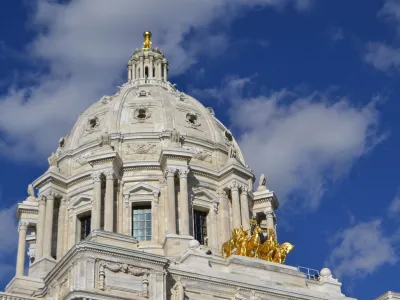What to expect in the 2021 Minnesota legislative session

Published January 11, 2021
On January 4th, the Minnesota House and Senate gaveled in a new year at the state Capitol. With COVID-19 and pressing state budget challenges to deal with, legislative districts that must soon be redrawn, and legislative control divided between the two parties, 2021 is unlikely to be a big year for energy policy. That said, CUB is following multiple bills already this year.
Here’s a look at what we anticipate this session.
CUB together with the Energy CENTS Coalition is leading an effort to improve the state’s intervenor compensation statute. The law, as currently written, allows qualifying nonprofits and certain other parties to have up to $50,000 of their costs reimbursed for participating (formally called “intervening”) in a utility rate case at the Public Utilities Commission. This is helpful; indeed, CUB received intervenor compensation in a Minnesota Power rate case last year, though the case was eventually withdrawn. However, most of the important decisions that affect ratepayers are now made in other types of Public Utilities Commission dockets – not only in rate cases. And, while $50,000 is a lot of money, it falls far short of what is truly needed to respond to proposals by utilities and other well-resourced parties. We hope to pass a bill to update the statute this session.
CUB continues to support the Energy Conservation and Optimization Act, or ECO. Broadly supported by utilities, environmental advocates, and labor groups, this bill would modernize the energy conservation programs that utilities are required to offer their customers. It would increase the amount of cost-effective energy savings that utilities must help their customers achieve. It would allow utilities to help customers shift their load away from high-demand hours and to help customers save energy, even if it means doing so by using a different fuel (for example, by installing an air-source heat pump). It would also double the amount that investor-owned utilities must spend on conservation programs for low-income customers.
A new version of the Clean Energy First bill has already been introduced in the House (HF 10). Senator David Senjem, the new chair of the Senate energy committee, has said he will introduce a version in the Senate, as well. The core concept of this bill is to ensure that utilities do not build fossil fuel power plants without first making sure that they cannot meet customers’ needs with clean energy resources. Senate versions of the bill in past years have also included language unrelated to clean energy that would have increased rates for residential consumers, as well as loopholes that weakened its clean energy purpose. CUB will be supporting a strong Clean Energy First bill.
We expect legislation to accelerate Minnesota’s path to 100% clean electricity. This has been a priority for Governor Walz and the House DFL leadership for the past two years, and CUB has supported the effort. We look forward to supporting another bill this year to move as fast as possible to clean energy with strong consumer protections.
There will also be bills to grant funding from Xcel’s Renewable Development Account (a pot of money Xcel pays into each year in exchange for storing nuclear waste in the state), reform the community solar program, and more.
The new biennium brings many new members to the House and Senate energy committees. We’re looking forward to introducing CUB and helping legislators get up to speed on energy topics.
We’ll provide more updates as they’re available on this blog as well as CUB’s Twitter and Facebook. Stay tuned for more updates, and feel free to contact me (annielf@cubminnesota.org) if you have comments or questions about the legislative session.